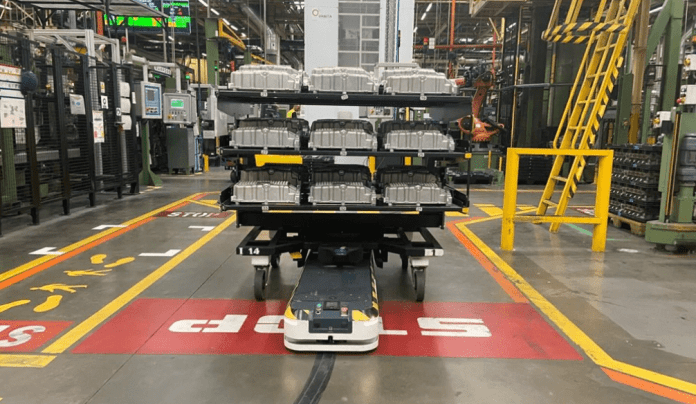Ericsson is to deploy a standalone private 5G network at a Ford engine plant in Valencia, in Spain. The trial installation is part of a European Union initiative to drive Industry 4.0 development. It puts focus on wireless control of autonomous automated guided vehicles (AGVs), as well as ‘next generation’ AGV management via human gesture recognition and virtual reality (VR) applications.
Ericsson is providing both radio and core networking solutions for the project. It said the 5G pilot network will dovetail with new edge computing, advanced robotics, and artificial intelligence (AI). The aim is to optimize logistics processes and distribution chains within the factory warehouses to improve efficiency, including production line efficiency, the Swedish vendor said.
The new Ford pilot, called 5G-INDUCE, is part of the Horizon 2020 5G Infrastructure Public-Private Partnership (5G-PPP), a joint initiative between the European Commission and the European ICT industry. 5G-INDUCE pitched squarely at the Industry 4.0 sector, around manufacturing and logistics.
Other firms involved are Burgo-based robotics outfit ASTI Mobile Robotics, Valencia-based industrial 5G firm Fivecomm, US-based VR firm YBVR, chipmaker Intel, Barcelona-based AI specialist Gestoos, plus the University of Burgos and the Universitat Politecnica de Valencia.
The offering will connect to Telefónica’s 5G-geared Open Innovation Laboratory (5TONIC) co-creation laboratory in Madrid, established with IMDEA Networks, the city’s research institute for tech innovation. Intel, also a 5TONIC member, is contributing edge computing technologies.
The group will use the 5G setup as a basic to “innovate and experiment” with Industry 4.0 applications. Ford employs about 900 people at its engine plant in Valencia.
Alejandro del Portillo, in the manufacturing engineering and new technologies department at Ford’s engine plant in Valencia, said: “New technologies can vastly improve production line efficiency, therefore increasing innovation capacity. This is essential given today’s competitive environment, and 5G is an instrumental tool to help us achieve this objective.”
Manuel Lorenzo, head of technology and innovation at Ericsson in Spain, said: “The potential of 5G is being unlocked as digitalization of industries is advancing and as more and more complementary players partner to shape new innovation ecosystems.
“The 5G-INDUCE project is a great example of this momentum – gathering world-class innovation in Industry 4.0, robotics, 5G, edge computing, virtual reality and artificial intelligence, and counting on the support of the EU 5G-PPP program. Ericsson is glad to contribute with our technology and expertise in 5G solutions to the success of this initiative.”

